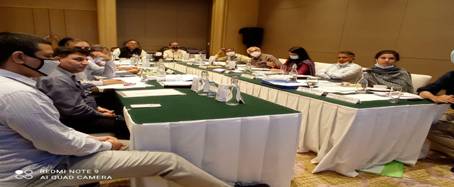A series of back to back meetings were held on 28.02.2021 and 01.03.2021 at Kolkata under the Chairmanship of the Chairman of the Expert GroupProf. SP Mukherjee and Director General, Labour Bureau Shri DPS Negito finalize the schedules and sampling methodology for the five All India Surveys relating to Domestic Workers, Migrant Workers, Employment Generated by the Professionals, the Employment Generated in Transport Sector and the All India Quarterly Establishment based Employment Survey.

Detailed discussions and in-depth deliberations were held to finalize and freeze the schedules for all the five All-India Surveys. Prof. S P Mukherjee, the Chairman of the Expert Group, in close consultation with the subject matter experts and senior officers from the IES and ISS discussed and finalized the schedules for all the Five All-India Surveys to be canvassed.
Power point presentations explaining sampling design and schedules for each of the five surveys were made by the officers of Labour Bureau and the subject matter experts. The schedules to be canvassed were deconstructed block-wise for each of the five All India surveys in detail. The same were finalized and frozen.
The Sampling Methodology for each of the five All-India Surveys was discussed in great detail. The officers-in-charge of the surveys made detailed presentations deconstructing the proposed sampling designs. The Chairman of the Expert Group, Prof. SP Mukherjee went into the depth of analyzing the proposed sampling methodology for each of the five surveys before finalizing the same.
The back-to-back meetings were a part of the 2-day comprehensive consultative sessions with subject-matter experts to discuss and finalize the schedules and the sampling methodology for the five All-India Surveys.
Shri D. P. S. Negi deeply appreciated the efforts put in by the subject-matter experts as well as the officers of Labour Bureau in designing the schedules and working out the sampling methodology. He stated that the data collected through these five bespoke All-India surveys will provide important inputs for evidence based policy making. Besides, it would help to fill the data gaps that existed until now as far as migrant and domestic workers are concerned.

